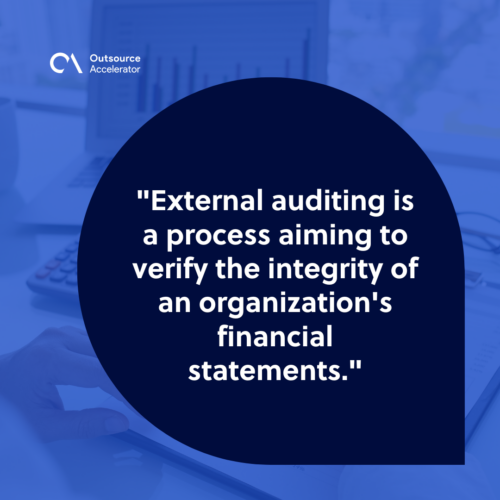Should you outsource external auditing processes?

Establishing your company’s reputation and financial health is most effective with an external perspective of your conditions.
According to the US Bureau of Labor Statistics (BLS), 20% of small businesses fail during their first two years, with financial difficulty as one of the reasons for their failure.
As a business owner, it’s good to think about constantly reporting profits. The best way to verify this is through an external eye-checking your accounts.
While small and medium companies only need internal audits, some experts advocate for external auditing, especially for growing entities.
However, conducting these audits in-house can be challenging and resource-intensive. That’s why many companies are considering the outsourcing option.
Clark Staff gives you a bird’s eye view of external auditing and whether you should outsource this function.
Defining external auditing
External auditing is a process aiming to verify the integrity of an organization’s financial statements. It assesses a company’s financial health and compliance with relevant regulations and accounting standards.
This process gives you an unbiased and objective evaluation of your company’s financial statements to confirm your successes.
Compared to internal auditing, external auditing is performed by an independent auditor or service provider. This is a great measure to prevent fraud and detect organizational embezzlement.

Importance of an external audit
Large companies are required to undergo external auditing, as regulated by the law. In the US, the Sarbanes-Oxley Act regulates this to protect investors from fraudulent reporting.
While not necessary, small companies gradually see the importance of external auditing, with the reasons listed below:
Ensuring credibility and reliability
One of the primary reasons for conducting an external audit is to enhance the credibility and reliability of a company’s financial statements.
External audits provide an independent assessment of the accuracy and fairness of the financial information presented. This credibility can help attract investment, secure financial help, and maintain stakeholder trust.
Identifying errors and fraud
External audits are vital in errors and fraud detection and prevention.
Independent auditors scrutinize financial records, transactions, and internal controls to identify potential discrepancies or fraudulent activities. External auditors help detect and prevent financial misstatements, protecting the company’s assets and reputation.
Compliance with regulations and standards
Adhering to the relevant regulations and accounting standards is crucial for maintaining transparency and avoiding legal consequences.
External audits verify whether a company adheres to financial reporting requirements. Auditors verify their documents according to generally accepted accounting principles (GAAP) for financial preparation for mergers and initial public offerings (IPOs).
By providing an unbiased assurance of compliance, external auditors help organizations avoid penalties, fines, and litigation arising from non-compliance.
Outsourcing external auditing: What’s the catch?
Local external auditors can be costly and difficult to find. Primarily, they earn as much as US$94,000 annually as independent contractors, not to mention the equipment and tools they will use to proceed with their work.
This is why external auditing is one of the popular functions outsourced to service providers such as Clark Staff. They provide caliber remote accounting and auditing experts to match clients’ needs and ensure better financial management.
Like most outsourced accounting processes, outsourcing external auditing can be risky but worth it when done right.
Here are a few considerations when you delegate this task to your service provider:
Expertise and resources
By engaging the services of an external audit firm, companies can tap into a wealth of expertise and experience.
These firms specialize in auditing and deeply understand the regulatory environment.
Moreover, outsourcing allows organizations to access a broader range of specialized skills and knowledge that may not be available in their home locations.
Objectivity and transparency
Hiring independent or freelance auditors may pose risks in terms of objectivity and bias. They are vulnerable to breaking compliances and provide false reports on your accounts.
Service providers strictly comply with the accounting standards and can influence your processes better.
Flexibility and cost-effectiveness
Outsourcing external auditing offers flexibility in terms of resource allocation.
While companies engage with external auditors on an as-needed basis, hiring local firms can be costly. Reports from Harvard Law School Forum on Corporate Governance revealed that companies pay more in external audit fees in the US – up to US$2.9 million per year.
Luckily, firms have a way to benchmark these fees through outsourcing. This enables them to scale their auditing resources depending on the complexity and volume of their financial transactions.
How Clark Staff experts guarantee quality external auditing
Clark Staff is a trusted partner that provides exceptional outsourcing solutions, including high-quality external auditing services.
With over 60 years of combined experience, Clark Staff has the expertise and a dedicated team of experts to ensure accurate and reliable external audits.
The company’s rigorous selection process ensures that its auditors are highly qualified and possess the necessary skills and knowledge to conduct comprehensive and objective audits.
Visit Clark Staff’s website to learn more about its comprehensive range of outsourcing solutions and how it can support your business’s growth and success.








 Independent
Independent




